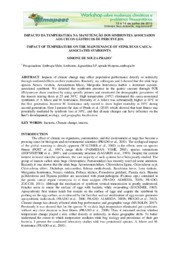Impacto da temperatura na manutenção dos simbiontes associados aos cecos gástricos de percevejos.
Impacto da temperatura na manutenção dos simbiontes associados aos cecos gástricos de percevejos.
Author(s): PRADO, S. de S.
Summary: Abstract: Impacts of climate change may affect population performance directly or indirectly through mediated effects on their mutualists. Recently, my colleagues and I showed that the stink bugs species Nezara viridula, Acrosternum hilare, Murgantia histrionica harbor a dominant caecum-associated symbiont. We detected the symbionts presence in the gastric caecum through PCR (Polymerase chain reaction) by using specific primers and monitored the demographic parameters of the insects rearing them at 25 and 30°C. High temperature (30ºC) eliminated the caeca-associated symbionts of A. hilare and M. histrionica. Mortality of A. hilare was substantially higher at 30°C in the first generation, however M. histrionica only started to show higher mortality at 30°C during second generation. Here I present the data of Prado et al. (2010) which showed that host fitness was potentially mediated by symbiont loss at 30°C, and that climate changes can have influence on the host's development, ecology, and geographic localization.
Publication year: 2012
Types of publication: Paper in annals and proceedings
Unit: Embrapa Environment
Keywords: Bacteria, Clima, Climate change, Impacto ambiental, Insects, Inseto, Temperatura, Temperature
Observation
Some of Embrapa's publications are published as ePub files. To read them, use or download one of the following free software options to your computer or mobile device. Android: Google Play Books; IOS: iBooks; Windows and Linux: Calibre.
Access other publications
Access the Agricultural Research Database (BDPA) to consult Embrapa's full library collection and records.
Visit Embrapa Bookstore to purchase books and other publications sold by Embrapa.

